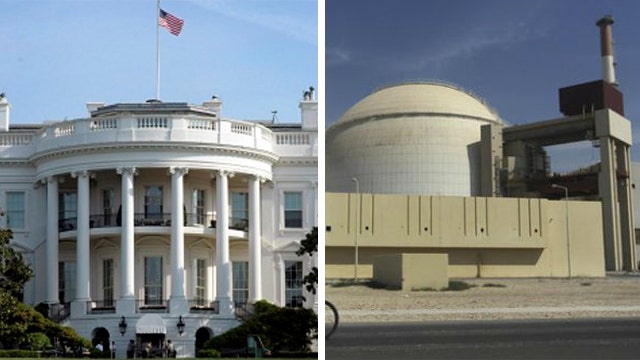Inside the Obama administration's push to sell Iran deal
Insight from The Washington Post's Ishaan Tharoor
House Republicans on Tuesday introduced legislation opposing the recently struck Iranian nuclear deal, launching a battle with the White House that could end in a veto showdown this fall.
House Foreign Affairs Committee Chairman Ed Royce, R-Calif., unveiled the legislation, saying the deal "gives up too much, too fast, to a terrorist state -- making the world less safe, less secure, and less stable."
A day earlier, House Republicans said they had the 218 GOP votes lined up for a so-called resolution of disapproval.
President Obama, meanwhile, is working to secure the backing of Democrats in both chambers. He won key endorsements on Tuesday, with Sen. Time Kaine, D-Va., and Bill Nelson, D-Fla., coming out in favor.
If both the House and Senate vote against the deal, Obama is certain to veto -- but foes would need to muster a two-thirds majority in Congress to override.
Though the United Nations is moving forward on many aspects of the nuclear agreement regardless, Congress would have leverage over U.S. sanctions, which Royce called "the most powerful economic sanctions in the world."
The deal itself would curb Iran's nuclear program in exchange for billions of dollars' worth of sanctions relief. Royce said the deal "falls well short" of a "verifiable, enforceable, and accountable agreement."
"The agreement gives Iran permanent sanctions relief, but in exchange only temporarily restrains Iran's nuclear program," he said in a statement. "If this agreement goes through, Iran gets a cash bonanza, a boost to its international standing, and a lighted path toward nuclear weapons."
But Kaine, in announcing his support, said it is a "dramatic improvement over the status quo in improving global security. The agreement takes a nuclear weapons program that was on the verge of success and disables it for many years through peaceful diplomatic means with sufficient tools for the international community to verify whether Iran is meeting its commitments."
On the sidelines, the lobbying grew in intensity on Tuesday, as Obama and Israeli Prime Minister Benjamin Netanyahu made dueling appeals to the American Jewish community.
Netanyahu made his case in a live webcast with more than 10,000 participants, according to the U.S. Jewish groups that organized the event. The prime minister railed against the agreement to curb Iran's nuclear program in exchange for billions of dollars in sanctions relief, calling it a "bad deal" that leaves Tehran on the brink of a bomb.
"The nuclear deal with Iran doesn't block Iran's path to the bomb," he said. "It actually paves Iran's path to the bomb."
Netanyahu, one of the fiercest critics of the nuclear accord, also disputed Obama's assertion that opponents of the diplomatic deal favor war. He called that assertion "utterly false," saying Israel wants peace, not war.
Obama was to hold a private meeting at the White House later Tuesday with Jewish leaders -- some who support the deal, some who oppose it, and others whose organizations are undecided.
The White House is preparing for the likelihood that lawmakers will vote against the deal and is focusing its lobbying efforts on getting enough Democrats to sustain a veto.
Only one chamber of Congress is needed to sustain a veto.
Obama spokesman Josh Earnest said Monday that the White House is confident it can sustain a veto "at least in the House."
Fox News' Chad Pergram and The Associated Press contributed to this report.

























